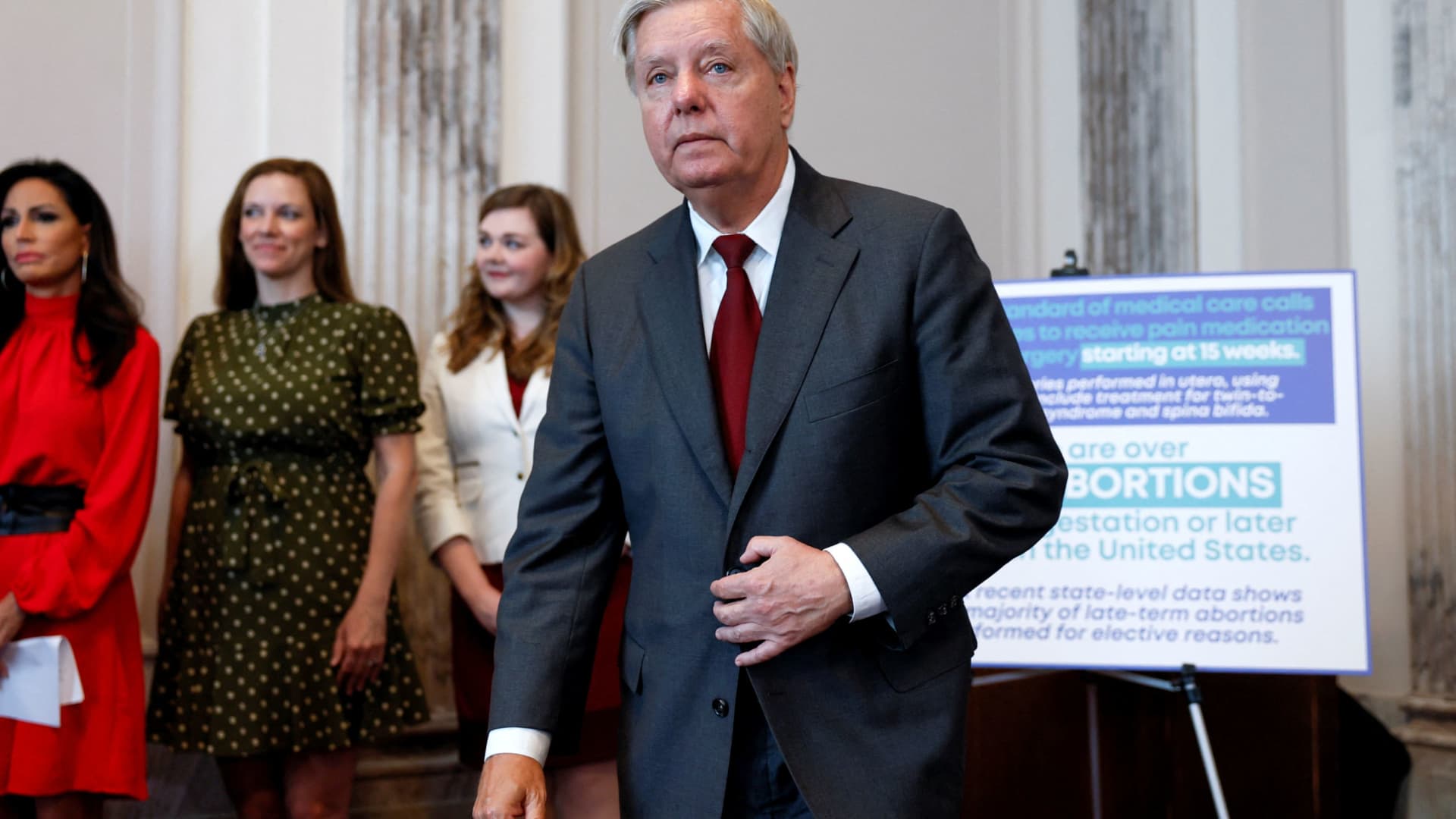Sen. Lindsey Graham introduces bill to ban most abortions nationwide after 15 weeks
The Supreme Court earlier this year overturned Roe v. Wade, the landmark ruling that established the constitutional right to abortion.

U.S. Senator Lindsey Graham (R-KY) unveils a nationwide abortion bill with new restrictions during a news conference on Capitol Hill in Washington, September, 13, 2022.
Evelyn Hockstein | Reuters
Republican Sen. Lindsey Graham introduced a bill Tuesday that would ban most abortions nationwide starting at 15 weeks of pregnancy.
The South Carolina senator introduced the bill less than three months after the Supreme Court overturned Roe v. Wade, the landmark ruling that established the constitutional right to abortion. The measure would sharply narrow abortion access in numerous states — especially blue states, which tend to have more abortion rights protections.
The legislation has little chance of passing Congress as it currently stands, as Democrats hold slim majorities in both the House and Senate.
It arrives ahead of the pivotal November midterm elections, where expectations of a Republican rout have been thrown into doubt as evidence mounts that the reversal of Roe has galvanized Democratic voters. Abortion rights advocates have warned that a GOP takeover of Congress would lead to an erosion of women's rights, and many were quick to hold up Graham's bill as a prime example.
Even Senate Minority Leader Mitch McConnell, the Republican who would decide whether to hold a vote on a nationwide abortion ban if the GOP wins the chamber in November, was reluctant to embrace Graham's bill.
"I think most of the members of my conference prefer that this will be dealt with at the state level," McConnell told reporters Tuesday afternoon. Other GOP senators have offered mixed messages on the bill.
While the title of Graham's bill suggests it would bar only "late-term" abortions, it would restrict the procedure nationwide after less than four months of pregnancy, a threshold that falls within the second trimester.
Abortions are typically considered "late term" at 21 weeks of pregnancy or later, according the health-policy nonprofit KFF. But the organization notes that that phrase is not an official medical term and that abortions at that stage are rarely sought and difficult to obtain.
The 15-week limit precedes the point of fetal viability, generally considered to be about 24 weeks' gestation. The Supreme Court ruled in Roe that women have the right to obtain an abortion before viability, and that states can start to impose restrictions after that point.
In the June ruling Dobbs v. Jackson Women's Health Organization, the high court by a 5-4 margin struck down Roe and Planned Parenthood v. Casey, another case upholding abortion rights. The ruling, by a court that had grown much more conservative after the appointment of three of former President Donald Trump's nominees, gave individual states the power to set their abortion policies.
Numerous Republican-leaning states immediately moved to ban abortion outright, while many Democratic leaders have sought to enshrine protections for the procedure.
Graham, a close Trump ally, had previously expressed support for states setting their own abortion laws. "That, in my view, is the most constitutionally sound way of dealing with this issue and the way the United States handled the issue until 1973," Graham tweeted in May.
But Graham has also introduced legislation to restrict abortion at the national level — though his 2021 bill would have banned abortion after 20 weeks, rather than the 15-week limit in the current version.
"Abortion is a contentious issue. Post Dobbs, America's got to make a decision," Graham said at a press conference Tuesday unveiling the new legislation.
"States have the ability to do it at a state level, and we have the ability in Washington to speak on this issue if we choose," he said. "I have chosen to speak."
At the 15-week mark, Graham said, the fetus has developed enough to feel pain from an abortion. After that point, his bill would allow no abortions except in cases of rape or incest or to save the life of the mother. "And that should be where America's at," the senator said.
Graham was flanked by the leaders of multiple anti-abortion groups, including Susan B. Anthony Pro-Life America President Marjorie Dannenfelser.
"This is incredible progress, but much more action is needed," Dannenfelser said in a statement.
The White House slammed Graham in a statement later Tuesday, calling the bill "wildly out of step with what Americans believe" and touting the Biden administration's legislative goals while accusing Republicans of "taking rights away from millions of women."
Pro-abortion rights groups echoed that sentiment, while tying the issue directly to the midterm elections.
"Anti-abortion rights congressional Republicans are showing us exactly what they plan to do if they get power: pass a national abortion ban," Planned Parenthood CEO Alexis McGill Johnson said in a statement.
"We would like to thank Senator Graham for making it crystal clear to voters today that Republicans are running on a national abortion ban in these midterms," said Dani Negrete, national political director of the progressive advocacy group Indivisible.
Polls show attitudes on abortion shifting toward the "pro choice" position after the Dobbs ruling. Some Republican candidates who previously touted hardline positions on abortion during GOP primaries have softened or muted their views as they compete in general elections.
Democratic candidates, such as Pennsylvania Senate nominee John Fetterman, have leaned into the issue.
"Dr. Oz has made it *very* clear that he wants to take away women's reproductive freedom," Fetterman tweeted Tuesday about his Republican opponent, Dr. Mehmet Oz. "With the GOP introducing a national abortion ban, it's now more important than ever that we stop him in November."

 Troov
Troov 































